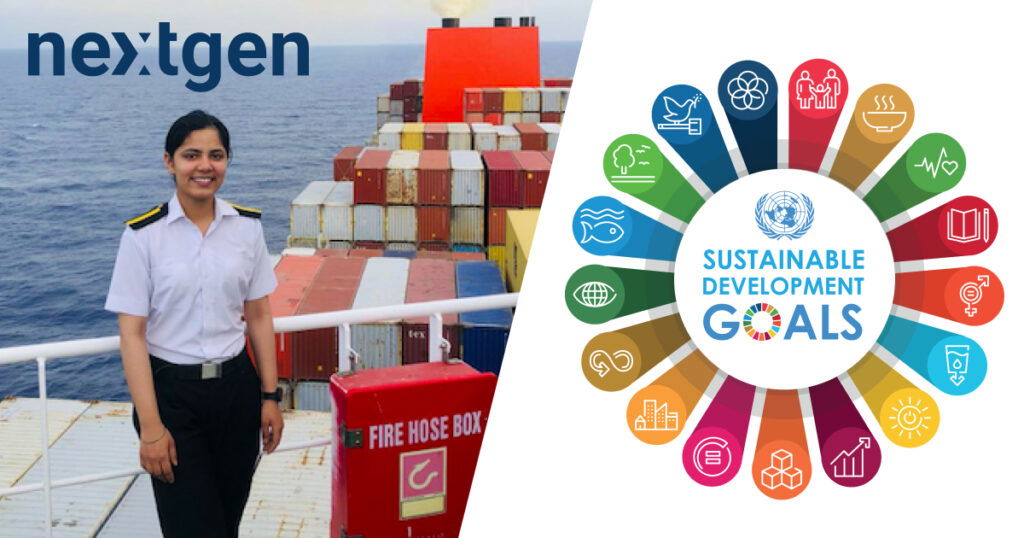
The maritime sector is defined as consisting of the individual shipping, port, marine and maritime business service industries, with a wide range of activities and responsibilities upon them. It has been exponentially growing over the years, including as regards the number of ships and seafarers, and in both on board and shore levels of job creation. When we talk about a 2050 vision for the maritime sector, the talk encompasses a lot of challenges, opportunities, hurdles and makeshifts that all need to be addressed in order to achieve that goal.
I believe that the maritime sector can expect to overcome various challenges en route to 2050. To name a few, decarbonisation, equitable growth, diversity, seafarer well-being, digitalisation, the need for resilience and creating awareness about this sector are all to be dealt with in this process of development.
I will start by talking about decarbonisation in the maritime sector.
Climate change is a reality, with the effects now undoubtedly visible in the form of harsher weather, untimely changing of seasons, rises in sea levels and an increasing rate of melting of the polar ice caps. Human health is also being affected directly by worsening food security, increased pressure on clean water supply and people migrating to seek safety. Levels of greenhouse gases are also at record highs, further driving climate change. Now, according to a report by the IMO, the shipping industry accounts for the production of about 2.9% of the world’s man-made emissions of CO2. It has started looking for alternative fuels, to work on reduction of its carbon footprint.
Having raised issues about global warming, it would be unfair not to talk about autonomous shipping. Rolls-Royce is one company that is working towards making autonomous shipping a reality, with the vision to bring it into action in the coming years. Autonomous shipping holds the potential for numerous benefits for the maritime industry, one being the reduction of human error, which often has a key role in accidents at sea. Some estimates have suggested that human error is the cause of between 75 and 96 percent of marine accidents. Also, a potential improvement in logistics can be seen with automation, by introduction of designated lanes on high seas and thus increased efficiency in cargo transport through autonomous ships.
However, there is a fear that this may eliminate a number of job posts and opportunities in the future, as autonomous shipping is less costly for shipowners, since it reduces the need for hefty salaries for seafarers. The maritime sector can take care of this issue by employing the former crew in the maintenance of the automated engines and machinery. This way not everyone will lose their jobs after autonomous shipping finally becomes a reality.
Nowadays, many shipping companies have started working towards a sustainable approach in shipping. In line with the IMO Secretariat’s SDG strategy, and with the 2020 World Maritime theme of “Sustainable shipping for a sustainable planet”, the IMO is ready to further raise awareness of the UN’s Sustainable Development Goals, and to support member states in their efforts to implement the 2030 agenda and make 2020-30 a decade of action. The agenda aims to focus on the various issues:
➢ No poverty
➢ Zero hunger
➢ Good health and well-being
➢ Quality education
➢ Gender equality
➢ Clean water and sanitation
➢ Affordable and clean energy
➢ Decent work and economic growth
➢ Industry, innovation, and infrastructure
➢ Reduced inequalities
➢ Sustainable communities
➢ Responsible consumption and production
➢ Climate action
➢ Life below water
➢ Life on land
➢ Peace, justice, and strong institutions
➢ Partnership for the goals
I am particularly proud of the fact that the Synergy Group is amongst the very few maritime companies that has integrated the SDGs into its strategy to make shipping sustainable, as well as tackle other challenges such as improving diversity and gender equality, eradicating corruption and social inequality, and enhancing mental health at sea.
Moving on to my next point, I strongly feel that there is a need to incorporate more women seafarers in this profession. Shipping has long been one of the world’s oldest male- dominated industries, historically due to the orthodox societies which divided gender roles and considered women inferior in terms of this profession. Though this thinking has gradually faded, lack of awareness in various areas means that there is still a lack of women seafarers. The IMO’s published findings are that a mere 2% of seafarers are women. Recently, with the increment in technology, the shipping industry has faced the new digital era. As our industry navigates the complexities of digitalisation and sustainable shipping, we will need talented men and also women to tackle the issues. In the current scenario, where big companies like Chevron, Synergy and BW are focusing on increasing the number of women seafarers, I can undoubtedly say that by 2050 we will have a fair gender ratio working in harmony with the maritime sector.
Finally, I would like to talk about something that I believe is of the utmost importance. While a seafarer is being trained, more emphasis is needed on practical training, as nothing can substitute experience. Educational programmes create exponential value when they go beyond the traditional four-walled experience and move into a more practical-based training. Practical experience needs to be made more frequent and progressively more challenging, as it will in the long run instil, in the minds of seafarers, responsibility and accountability towards work.
To date, the maritime sector has dealt with numerous challenges, with for example LNG fuel for propulsion units, sulphur scrubber systems and ECDIS, all of which are now reality when they were unthinkable only recently. Though it still has a fair way to go, with this pace of development I believe that our shipping industry will always become ever more efficient in performing its duties. I have a vision that by 2050 emissions will no longer be much of a problem in the maritime sector. With the positive hope of these advancements and of the changes that I have discussed, I end my essay.
Deck Cadet Urmi – “Maersk Esmeraldas”



